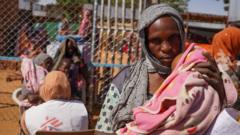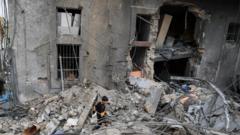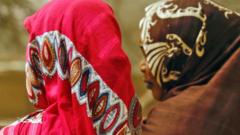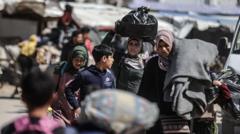As the conflict in Sudan continues to escalate, el-Fasher's residents share their heart-wrenching experiences through smuggled phones, detailing hunger, loss, and fear amid ongoing violence.
Voices from the Siege: Life Under Fire in Sudan's el-Fasher

Voices from the Siege: Life Under Fire in Sudan's el-Fasher
In a new BBC investigation, the harrowing realities of life in the besieged city of el-Fasher during Sudan's civil war are revealed through the accounts of young residents.
Article:
Heba Bitar, BBC Eye Investigations, el-Geneina
In el-Fasher, a city besieged by warfare in Sudan's ongoing civil conflict, personal stories of grief and survival emerge from the shadows. Twenty-one-year-old Hafiza lost her mother when a shell struck their market, leaving her to care for her siblings: a five-year-old brother and two teenage sisters. Using one of several phones provided by the BBC World Service, she narrates her turbulent journey during a year of constant bombardment, isolation, and heartbreak.
El-Fasher has endured relentless attacks for a year, making access for journalists impossible. Safety protocols require that only first names are used for individuals eager to share their stories, like Hafiza, who reflects on the grief of losing her mother. Amid personal tragedy, she has sought to support the community through volunteer work, distributing basic necessities to displaced residents struggling under dire circumstances.
The civil war, which began two years ago, pits the Sudanese army against the paramilitary Rapid Support Forces (RSF), creating an unprecedented humanitarian crisis. Once allies, the two factions fell out over a push for civilian governance. As the RSF surrounds el-Fasher, residents face daily threats of violence and scarcity of essential goods.
Mostafa, a 32-year-old resident, documents the chaos and destruction surrounding his neighborhood. With artillery pounding the city day and night, his efforts to provide aid at shelters were often cut short by attacks. The stark reality he conveys is a life spent in fear—death can emerge from any corner, leaving families shattered and homes abandoned.
Manahel, a 26-year-old who volunteered in food kitchens, shares that many live below the poverty line, unable to afford basic sustenance. Forced to move further from the frontlines with her family, she lost her father to RSF gunfire, exemplifying the human cost of the conflict. As fighting escalates, fears of becoming targets for violence grow, especially for residents from non-Arab communities facing the specter of ethnic targeting.
While the United Nations reports tens of thousands killed in past conflicts over ethnic lines, efforts to uncover the truth remain complicated. Restrictions hinder international reporters, limiting their view of ongoing atrocities. An encounter with RSF forces revealed a vastly different portrayal of their role in the conflict, emphasizing the disconnection between ground realities and official narratives.
Compounded by food shortages, power outages, and the haunting specter of violence, life in el-Fasher has become unlivable. Condemned by war, Hafiza, Mostafa, and Manahel ultimately made the decision to leave the city in search of safety, departing without assurance of what the future holds. As they ponder their ordeal, the lingering question is whether they will ever return to a city they once called home.
As the situation in Darfur intensifies, the plight of its residents continues to draw urgent attention, underscoring the desperate need for humanitarian support and conflict resolution in a region tormented by years of violence.
Heba Bitar, BBC Eye Investigations, el-Geneina
In el-Fasher, a city besieged by warfare in Sudan's ongoing civil conflict, personal stories of grief and survival emerge from the shadows. Twenty-one-year-old Hafiza lost her mother when a shell struck their market, leaving her to care for her siblings: a five-year-old brother and two teenage sisters. Using one of several phones provided by the BBC World Service, she narrates her turbulent journey during a year of constant bombardment, isolation, and heartbreak.
El-Fasher has endured relentless attacks for a year, making access for journalists impossible. Safety protocols require that only first names are used for individuals eager to share their stories, like Hafiza, who reflects on the grief of losing her mother. Amid personal tragedy, she has sought to support the community through volunteer work, distributing basic necessities to displaced residents struggling under dire circumstances.
The civil war, which began two years ago, pits the Sudanese army against the paramilitary Rapid Support Forces (RSF), creating an unprecedented humanitarian crisis. Once allies, the two factions fell out over a push for civilian governance. As the RSF surrounds el-Fasher, residents face daily threats of violence and scarcity of essential goods.
Mostafa, a 32-year-old resident, documents the chaos and destruction surrounding his neighborhood. With artillery pounding the city day and night, his efforts to provide aid at shelters were often cut short by attacks. The stark reality he conveys is a life spent in fear—death can emerge from any corner, leaving families shattered and homes abandoned.
Manahel, a 26-year-old who volunteered in food kitchens, shares that many live below the poverty line, unable to afford basic sustenance. Forced to move further from the frontlines with her family, she lost her father to RSF gunfire, exemplifying the human cost of the conflict. As fighting escalates, fears of becoming targets for violence grow, especially for residents from non-Arab communities facing the specter of ethnic targeting.
While the United Nations reports tens of thousands killed in past conflicts over ethnic lines, efforts to uncover the truth remain complicated. Restrictions hinder international reporters, limiting their view of ongoing atrocities. An encounter with RSF forces revealed a vastly different portrayal of their role in the conflict, emphasizing the disconnection between ground realities and official narratives.
Compounded by food shortages, power outages, and the haunting specter of violence, life in el-Fasher has become unlivable. Condemned by war, Hafiza, Mostafa, and Manahel ultimately made the decision to leave the city in search of safety, departing without assurance of what the future holds. As they ponder their ordeal, the lingering question is whether they will ever return to a city they once called home.
As the situation in Darfur intensifies, the plight of its residents continues to draw urgent attention, underscoring the desperate need for humanitarian support and conflict resolution in a region tormented by years of violence.

















